|
|
|
Sort Order |
|
|
|
Items / Page
|
|
|
|
|
|
|
| Srl | Item |
| 1 |
ID:
189959
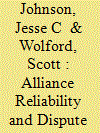

|
|
|
|
|
| Summary/Abstract |
States form defensive alliances hoping to deter adversaries and avoid war. However, scholars and policy analysts often worry that if an alliance fails to deter the promise of military support will encourage escalation, pushing disputants closer to war. We show that in many cases this concern is unwarranted. We use a game-theoretic model of alliance reliability and crisis bargaining to show that the same factors that indicate unreliability and provoke disputes also encourage alliance members to make concessions rather than risk war. We test this hypothesis using a sample of militarized disputes initiated against members of defensive alliances, where recent shifts in military capabilities represent changes in challengers’ estimates of alliance reliability. Less-reliable alliances are less likely than reliable allies to deter disputes, but they also decrease the probability of escalation relative to reliable alliances. Unreliable alliances need not encourage war; rather, they can discourage it.
|
|
|
|
|
|
|
|
|
|
|
|
|
|
|
|
| 2 |
ID:
068736
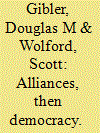

|
|
|
| 3 |
ID:
117525
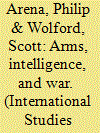

|
|
|
|
|
| Publication |
2012.
|
| Summary/Abstract |
How do states respond to uncertainty over their opponents' military strength? We analyze a model of crisis bargaining in which, prior to negotiation, an uninformed state chooses how to allocate scarce resources across armaments and intelligence gathering. Arming improves military capabilities, while intelligence gathering improves estimates of the other state's military capabilities. Our model thus allows both the distribution of power and the level of uncertainty in the crisis to be determined endogenously. We derive some notable results. First, the relationship between information revelation and war is conditional on beliefs held before the information is received, as more accurate information can reduce the probability of war for optimistic states but increase it for pessimistic ones. Second, the allocations that minimize the probability of war are often not those made in equilibrium. Finally, considering the interdependence between the two allocations yields unique insights into the relationship between the distribution of capabilities, uncertainty, and the risk of war.
|
|
|
|
|
|
|
|
|
|
|
|
|
|
|
|
| 4 |
ID:
117016


|
|
|
|
|
| Publication |
2012.
|
| Summary/Abstract |
Leadership turnover may produce significant foreign policy changes when leaders differ from their predecessors in their preferences over the resort to war and when they cannot commit to implement inherited policies. How, then, does the expected behavior of an incumbent leader's successor affect crisis bargaining in the present? I analyze a leader-centric model of crisis bargaining in which (a) the distributive outcomes of crises affect political survival, (b) leadership turnover implies the accession of a new leader with potentially different preferences, and (c) successors can renegotiate inherited settlements. In equilibrium, the sensitivity of an incumbent's political survival to making concessions interacts with the resolve of the successor to affect both the terms of settlement and the occurrence of war. First, political survival incentives can lead an incumbent to demand more than her adversary is willing to concede, provoking war when the successor is of similar resolve. Second, when a politically sensitive incumbent will be followed by a resolute successor, her adversary may grant otherwise unnecessary concessions to bolster the relatively irresolute incumbent in office. Finally, when a politically sensitive incumbent will be followed by an irresolute successor, her adversary may attack in order to depose the incumbent, hastening her replacement to secure better bargains in the future. Predictions about the present balance of resolve and leaders' survival incentives may thus be fundamentally altered in light of the future balance of resolve.
|
|
|
|
|
|
|
|
|
|
|
|
|
|
|
|
| 5 |
ID:
107922


|
|
|
|
|
| Publication |
2011.
|
| Summary/Abstract |
The authors analyze a bargaining model of war that incorporates both commitment problems due to shifting power and asymmetric information. Four results emerge when both bargaining problems are present. First, in contrast to asymmetric information models, the resolution of uncertainty through fighting can lead to the continuation of war rather than its termination. Second, wars can be less-not more-likely to end in settlement the longer they last. Third, war aims increase over time as a belligerent becomes more confident that its opponent will grow unacceptably strong in the future. Finally, the dynamics that characterize wars in purely asymmetric information or commitment models should exist only when the other factor is absent.
|
|
|
|
|
|
|
|
|
|
|
|
|
|
|
|
| 6 |
ID:
148040
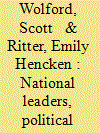

|
|
|
|
|
| Summary/Abstract |
States frequently form military coalitions, and these collaborations matter a great deal for international politics, yet their origins are poorly understood. Building coalitions in international crises improves military prospects. At the same time, it requires policy concessions to compensate partners. We show that a national leader’s job security affects her willingness to make this tradeoff. First, politically insecure leaders are more willing to form coalitions than secure leaders. The former face greater incentives to accept tradeoffs in order to bolster their chances of victory and thereby improve their chances of remaining in power. Second, politically insecure leaders are also less selective in their choice of partners. Their willingness to make larger policy concessions leads them to form coalitions with states of increasingly divergent foreign policy preferences. A sample of crises from 1951-1999 provides statistical support for these arguments.
|
|
|
|
|
|
|
|
|
|
|
|
|
|
|
|
| 7 |
ID:
168432
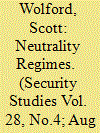

|
|
|
|
|
| Summary/Abstract |
I analyze a model of war expansion in the shadow of international law, where neutrality regimes emerge as equilibria in which only aggressive states are expected to violate the law. By sorting belligerents according to their ambitions (restrained or aggressive), neutrality regimes can help resolve third-party uncertainty over the desirability of balancing. Punishment for violations of the law emerges in equilibrium from self-interested power calculations absent any principled legal commitment. The model shows that (a) neutrality regimes can be effective not despite but because of inconsistent compliance; (b) strong third parties are uniquely prone to failures to balance under neutrality regimes; and (c) ratification of neutrality regimes can be facilitated by mutual and severe mistrust. Neutrality regimes need not be epiphenomenal to power politics; rather, they can support balance-of-power systems.
|
|
|
|
|
|
|
|
|
|
|
|
|
|
|
|
| 8 |
ID:
141850


|
|
|
|
|
| Summary/Abstract |
Can the discovery of petroleum resources increase the risk of civil conflict even before their exploitation? We argue that it can, but only in poorer states where oil revenues threaten to alter the balance of power between regimes and their opponents, rendering bargains in the present obsolete in the future. We develop our claims via a game-theoretic model of bargaining between a government and a rebel group, where decisions over war and peace occur in the shadow of increasing oil wealth that both increases national wealth and shifts relative power in the government's favor. To test the model's main hypothesis, we leverage data on newly discovered oil deposits as an indicator of the state's expected future power resources. Our argument has important implications for the literature on credible commitments, power shifts, and violent conflict.
|
|
|
|
|
|
|
|
|
|
|
|
|
|
|
|
| 9 |
ID:
131006
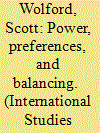

|
|
|
|
|
| Publication |
2014.
|
| Summary/Abstract |
Conflicts can expand when third parties perceive future threats from attackers, but how do they evaluate threats from coalitions rather than single states? Multilateral aggregations of power can generate fear in observers that coalitions may soon turn against them. Yet only some provoke opposition from observers, reducing their chances of success and expanding the conflict, while others do not. What accounts for this difference? I analyze a game-theoretic model of a third party's decision to intervene in an ongoing conflict and a coalition's decision to disband afterward, which is most likely when its preferences are diverse. When coalitions are powerful, an increasing diversity of foreign policy preferences reduces the probability that observer states balance against them, but when coalitions are weak, increasing diversity increases the probability of balancing. I find support for this conditional relationship between power, preferences, and balancing in a sample of 180 interstate crises from 1946 to 2000.
|
|
|
|
|
|
|
|
|
|
|
|
|
|
|
|
| 10 |
ID:
147548
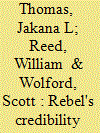

|
|
|
|
|
| Summary/Abstract |
This article examines why rebel groups make large demands of governments that are inconsistent with their fighting capacity, especially when such demands are almost always rejected. We show that making large demands, even if ultimately rejected by the government, makes sense for rebels who face a credibility dilemma. Such a dilemma is most likely to arise when militarily weak rebel groups face governments of uncertain strength and can commit to fight credibly only when they believe the government is also weak. This results in a counterintuitive set of strategic incentives for weak rebels, who choose their demands to ensure that they are rejected even when the government is weak. Thus, to make their threat to fight credible, weak rebels make large demands that, when rejected, result in inefficient fighting. Since most civil wars are characterized by weak rebels bargaining with much stronger governments, it is important to understand how this particular feature of civil war shapes intrawar negotiations between the rebels and the government. We develop a model of bargaining between a government and rebel group and evaluate its implications using historical data on civil conflict in Africa from 1989 to 2010. The results suggest that the tendency for the government to be significantly stronger than rebels induces rebel groups to make unrealistically large demands.
|
|
|
|
|
|
|
|
|
|
|
|
|
|
|
|
|
|
|
|
|